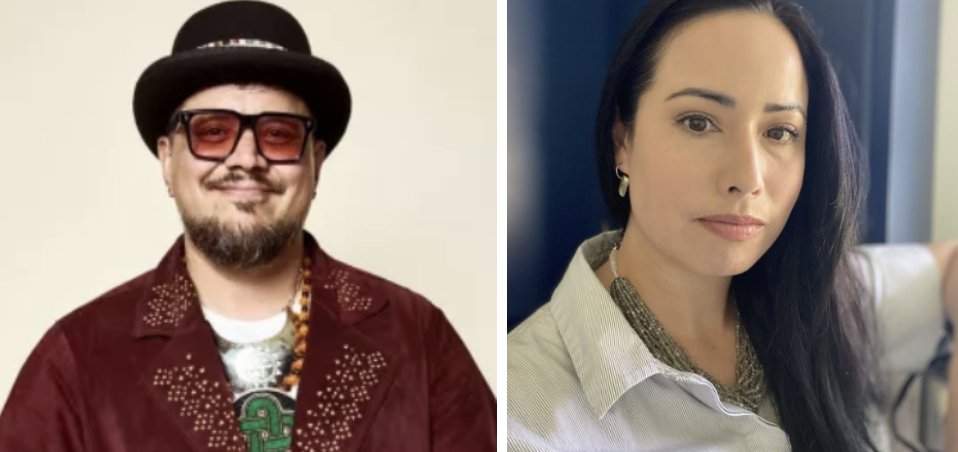
- Details
- By Kaili Berg
Two groundbreaking Indigenous artists, filmmaker Sterlin Harjo and visual artist Wendy Red Star, have been named 2024 MacArthur Fellows.
This recognition comes with an $800,000 unrestricted grant for each fellow, awarded to support their continued contributions to the fields of film, television, and visual art. Known informally as "Genius Grants," these fellowships are awarded to individuals who have demonstrated extraordinary creativity and potential for future achievements.
The MacArthur Fellowship is designed to provide financial flexibility, encouraging recipients to pursue their work without restrictions or limitations. The fellowship recognizes individuals across all disciplines who are working to deepen the understanding of society and foster positive change.
Harjo, a filmmaker and producer from the Seminole and Muscogee (Creek) Nations, is known for changing the way Native American life is portrayed on screen. His work aims to replace harmful stereotypes with real, authentic stories that highlight the richness of Native culture, often through humor and collaboration with other Indigenous creatives.
Harjo co-created Reservation Dogs, a widely praised TV series that focuses on the lives of Indigenous youth in rural Oklahoma. The show has been celebrated for its all-Indigenous cast and crew, marking a significant step forward in how Native voices are represented in mainstream media.
Red Star, a visual artist from the Apsáalooke (Crow) Nation, uses her work to challenge the ways Native people have been portrayed in museums, history books, and pop culture. She often draws from archives to explore Apsáalooke history and how Indigenous people are represented.
Through humor and satire, Red Star’s art critiques oversimplified portrayals of Native Americans, encouraging viewers to think critically about history and how it is told. Her work has gained attention for its fresh perspective on historical misrepresentation.
“The 2024 MacArthur Fellows pursue rigorous inquiry with aspiration and purpose. They expose biases built into emerging technologies and social systems and fill critical gaps in the knowledge of cycles that sustain life on Earth,” Marlies A. Carruth, Director of the MacArthur Fellows said in a statement. “Their work highlights our shared humanity, centering the agency of disabled people, the humor and histories of Indigenous communities, the emotional lives of adolescents, and perspectives of rural Americans.”
The fellowship offers both Harjo and Red Star the freedom to continue pushing the boundaries of their respective fields, ensuring that their contributions to Indigenous art and storytelling will grow even more impactful in the years to come.
More Stories Like This
From Dishwasher to Award-Winning Chef: Laguna Pueblo's Josh Aragon Serves Up Albuquerque's Best Green Chile StewRob Reiner's Final Work as Producer Appears to Address MMIP Crisis
Vision Maker Media Honors MacDonald Siblings With 2025 Frank Blythe Award
First Tribally Owned Gallery in Tulsa Debuts ‘Mvskokvlke: Road of Strength’
Zuni Youth Enrichment Project and Partners at Ho’n A:wan Productions Launch 8th Annual Delapna:we Project
Help us defend tribal sovereignty.
At Native News Online, our mission is rooted in telling the stories that strengthen sovereignty and uplift Indigenous voices — not just at year’s end, but every single day.
Because of your generosity last year, we were able to keep our reporters on the ground in tribal communities, at national gatherings and in the halls of Congress — covering the issues that matter most to Indian Country: sovereignty, culture, education, health and economic opportunity.
That support sustained us through a tough year in 2025. Now, as we look to the year ahead, we need your help right now to ensure warrior journalism remains strong — reporting that defends tribal sovereignty, amplifies Native truth, and holds power accountable.
 The stakes couldn't be higher. Your support keeps Native voices heard, Native stories told and Native sovereignty defended.
The stakes couldn't be higher. Your support keeps Native voices heard, Native stories told and Native sovereignty defended.
Stand with Warrior Journalism today.
Levi Rickert (Potawatomi), Editor & Publisher


